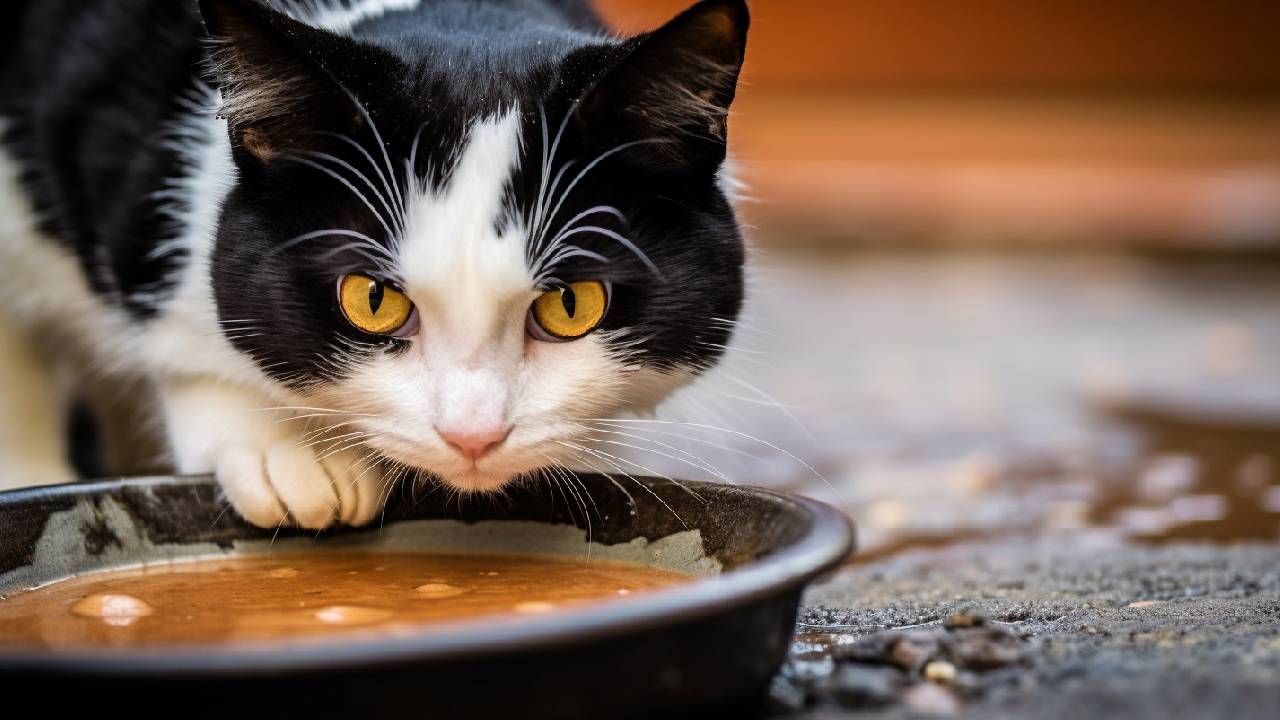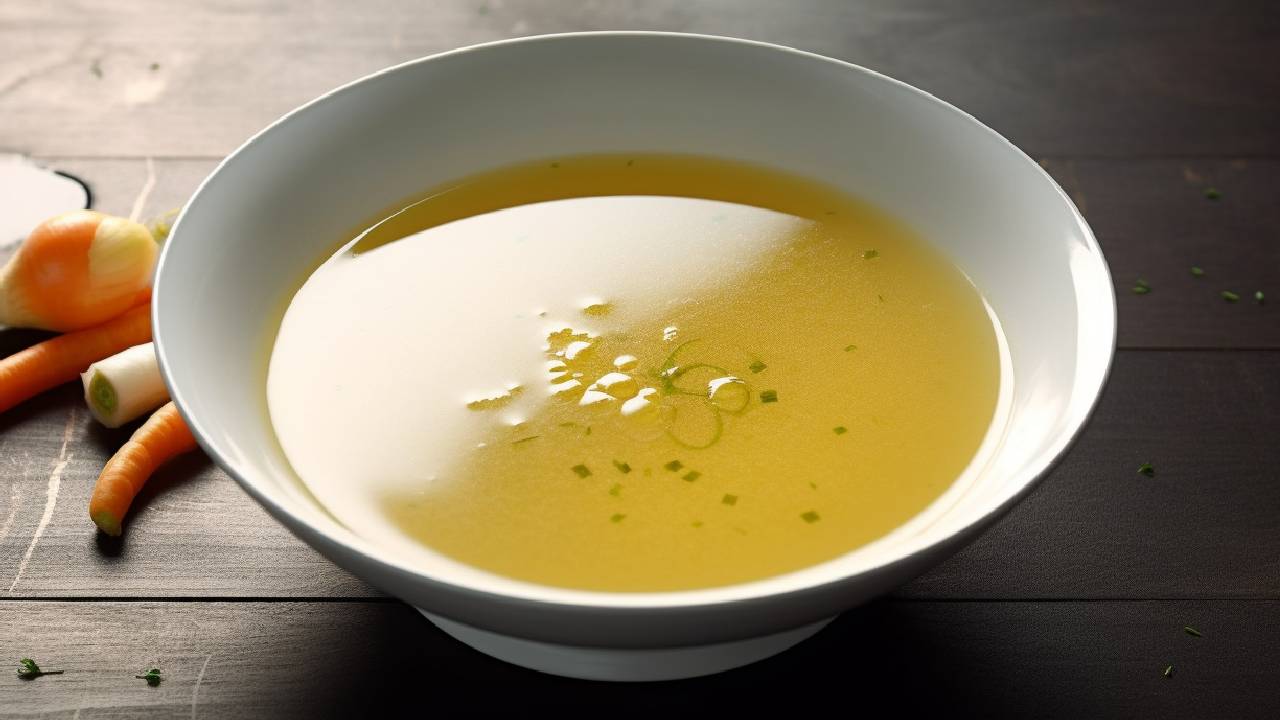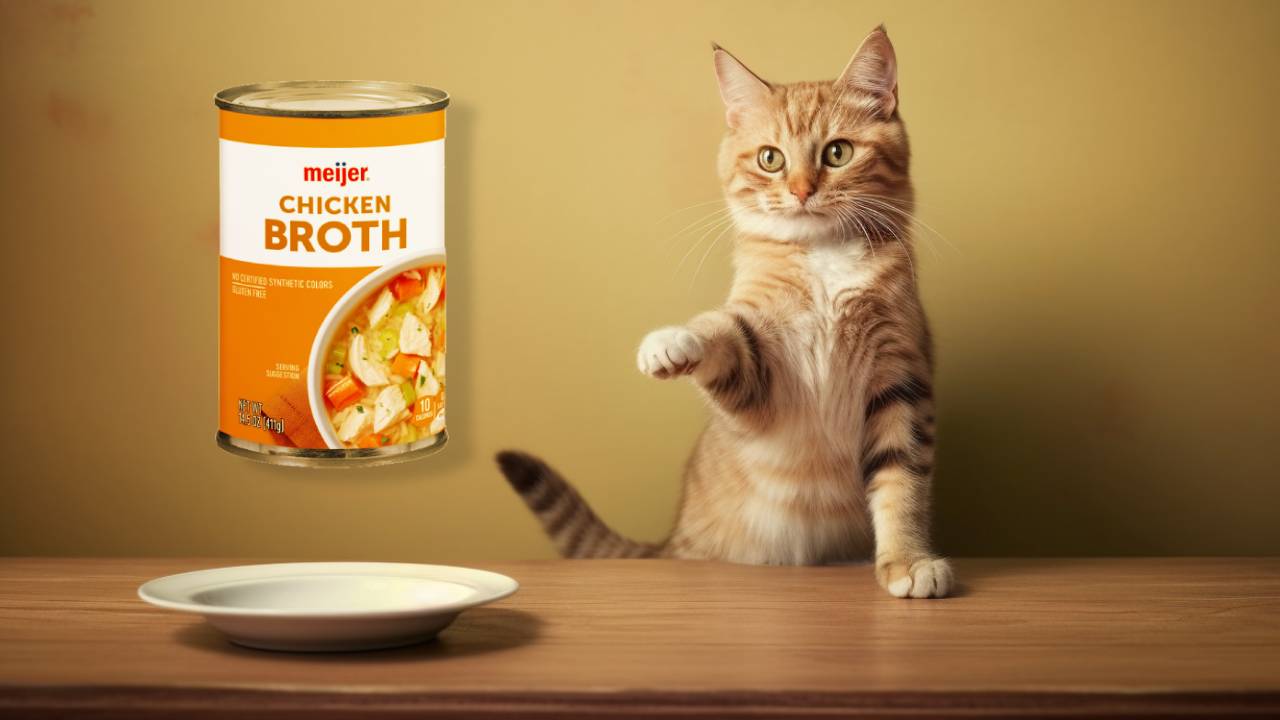If you’ve ever enjoyed a warm bowl of chicken broth and found your cat casting longing glances, you might wonder if sharing this flavorful treat with your furry companion is safe and suitable.
This article will delve into the world of chicken broth for cats. We will explore the nutritional aspects, the process of preparing chicken broth, and how to introduce this liquid delight to your feline friend.
The Appeal of Chicken Broth to Your Cat
Chicken broth can be inviting to cats with its flavorful essence. The scent of cooked chicken piques their interest when it’s transformed into a delightful broth. But is it appropriate for cats to enjoy?
Absolutely! Cats can indeed have chicken broth. The captivating aroma and mouthwatering taste make it a paw-some treat. But remember, moderation is key! Chicken broth can be high in sodium, so it’s best as an occasional indulgence.
Is Chicken Broth Safe for Cats?
Chicken broth is primarily made by simmering chicken meat, bones, and sometimes vegetables in water. The resulting liquid contains flavors, nutrients, and minerals extracted from these ingredients.
However, it’s important to note that while chicken broth can be flavorful, it may not provide a comprehensive and balanced set of nutrients that cats require. Cats are obligate carnivores whose dietary needs are centered around animal-based proteins.
While chicken is a protein source that cats can benefit from, it’s essential to ensure their nutritional requirements are met through a well-formulated cat food diet. Tasty chicken broth should not replace a high-quality commercial cat food that meets feline dietary needs.
Allergies
Just like humans, cats can have food allergies or sensitivities. While chicken is generally well-tolerated, some cats may develop allergic reactions to certain proteins. Consult your veterinarian if you notice any adverse reactions after feeding chicken broth.
Digestive Upset
Introducing new foods, including chicken broth, can sometimes lead to digestive upset in cats. This might manifest as vomiting, diarrhea, or general discomfort. Start with small amounts and observe your cat’s response.
Bones and Safety Precautions
One common concern when feeding cats chicken broth is the potential presence of bones in the liquid. Chicken bones can splinter when cooked and pose a choking hazard or the risk of causing internal injuries to cats.
If you’re considering offering chicken broth to your cat, it’s essential to ensure that the broth is free from small bone fragments that could be harmful.

Preparing Chicken Broth for Cats: Dos and Don’ts
Preparing chicken broth for your cat requires careful consideration to ensure it gives nutritional value. While it might seem straightforward, there are several dos and don’ts to remember when creating this liquid delight for your cat.
Dos:
- Use Boneless Chicken
When preparing chicken broth for cats, always use boneless chicken.
- Keep It Simple
Stick to the basics when making cat chicken broth. Use plain boneless chicken and water.
- Simmer Gently
Simmer the boneless chicken in water over low heat to extract flavors and nutrients. This gentle cooking process helps create a delicious broth.
- Strain the Broth
Once the chicken is cooked, strain the broth to remove any particles.
Don’ts:
- Avoid Onions and Garlic
Onions and garlic are toxic to cats and should never be included in preparing chicken broth or any other food offered to your cat.
- No Artificial Ingredients
Avoid artificial flavorings, colorings, or preservatives. Stick to natural and simple ingredients.
Introducing Chicken Broth to Your Feline Friend
Introducing new foods to your cat’s diet requires patience and a gradual approach. For chicken broth, take the time to acquaint your kitty with this unique flavor experience. Here are some tips for a smooth introduction:
- Start with a Whiff
Before offering chicken broth, let your cat get a whiff of the aroma. Cats rely heavily on their sense of smell, and the enticing scent can pique their curiosity.
- Dilute and Observe
Initially, dilute the chicken broth with water to make it milder. Allow your cat to take a few laps and observe their reaction. Some cats may take to it immediately, while others might need time to adjust.
- Use Familiar Bowls
Serve the diluted chicken broth in your cat’s familiar food or water bowl. Familiarity can help ease their transition to the new treat.
- Monitor Interest
Pay attention to your cat’s level of interest. Some cats may lap up the broth eagerly, while others might show a more reserved response. Respect their preferences and don’t force them to consume it.
- Gradual Increase
You can gradually increase the concentration if your cat shows interest and tolerates the diluted broth well. However, always prioritize moderation.
How Do I Feed Chicken Broth to My Cat?
Once you’ve successfully introduced chicken broth to your cat, the next step is determining how to incorporate it into their diet. Here are some practical ways to feed chicken broth to your cat:
- As a Tasty Topper
Chicken broth can be drizzled over your cat’s regular food as a tasty topper. This adds flavor to their meals and can encourage picky eaters to enjoy their food.
- Frozen Delights
Consider freezing diluted chicken broth in ice cube trays. These frozen cubes can serve as refreshing and flavorful treats, especially on hot days.
- Hydration Boost
If your cat tends to be fussy about drinking water, you can dilute chicken broth with water and offer it as a hydrating treat.
- Kitty Lick Mat
Spread a small amount of diluted chicken broth on a lick mat. Cats can enjoy licking off the broth, which also provides mental stimulation.
- Solo Sip
Some cats might enjoy sipping chicken broth directly from a shallow dish. This can be an enjoyable bonding experience between you and your cat.

Alternatives to Chicken Broth
There are several safe and nutritious alternatives to chicken broth, they include:
- Plain Water
Hydration is crucial for cats. Clean, fresh water is one of the best ways to keep your cat well-hydrated and happy.
- Commercial Cat Treats
Many pet stores offer cat treats specifically formulated to be safe and enjoyable for felines.
- Cooked Meat
Plain-cooked chicken, turkey, or fish can be a tasty and protein-rich treat for your cat.
- Cat Grass
Cat grass is safe for most cats and can provide mental stimulation and natural roughage for their digestive system.
- Frozen Treats
Freeze small portions of wet cat food or tuna water in ice cube trays for a refreshing treat.
Consulting the Vet’s Perspective on Feeding Chicken Broth
It’s always a good idea to consult your veterinarian before introducing new foods, including chicken broth, into your cat’s diet.
Your veterinarian can provide personalized advice based on your cat’s health, dietary needs, and any specific concerns you may have. They can help determine whether chicken broth suits your cat and guide you on portion sizes and frequency.
Conclusion
Every cat is an individual with their tastes and tolerances. Discovering what delights your cat and contributes to their overall health is rewarding.
Embrace the moments shared over a bowl of chicken broth, and revel in the joy of nurturing a lifelong bond built on trust, care, and understanding.

FAQs About Feeding Chicken Broth to Cats
Can I use chicken broth as a remedy for my sick cat?
While chicken broth can be soothing, it’s not a substitute for veterinary care. If your cat is ill, consult your vet for proper diagnosis and treatment.
Can chicken broth replace water in my cat’s diet?
Cats have specific water requirements, and freshwater should always be available. Chicken broth can provide additional flavor and hydration but should not replace your cat’s primary water source.
How much chicken broth can I give my cat at once?
Start with a small amount, such as a teaspoon, and observe your cat’s response. Avoid overfeeding, as too much broth can upset their stomach or lead to an imbalance in their diet.
Is chicken broth safe for kittens?
Kittens have delicate digestive systems, and introducing new foods should be done cautiously. Consult your veterinarian before offering chicken broth to kittens, as their nutritional needs differ from adult cats.
Can chicken broth help cats with dental issues?
Diluted chicken broth can be offered to cats with dental issues or decreased appetite. Ensuring the broth is unsalted without additives that might worsen dental problems is vital.






Thanks for clearing that up! 🐱🍗
my cat crazy for chicken broth